That might be easy if you’re working for a tech-forward company like Ahrefs with a boss that understands the value and importance of SEO, but it can be more of a challenge for those with less web-savvy bosses.
In this guide, we’ll discuss how you might go about constructing an argument that’s more likely to win over your boss.
But first, let’s briefly discuss why you’d want to do this…
SEO has the power to drive traffic and sales to your company’s website and improve its bottom line. If you’re on the marketing team for the company you work for, this is essentially your job description.
But what’s in this for you besides a pat on the back?
If you can convince your boss to invest in marketing ideas that positively contribute to your company’s bottom line, you can use that to your advantage in the future. You might use it to get a raise, a promotion, or just more resources. The possibilities are endless.
If you believe that persuading your boss to invest in SEO is the right move, the first thing to consider is that your boss probably doesn’t give two hoots about SEO. They only care about their bottom line.
Keep this in mind when framing your argument.
If you frame your pitch around things that we marketers get excited about, like traffic, backlinks, or website authority, you’re going to lose. You need to explain how SEO will make your boss more money and help them reach their business goals.
Let’s run through how you can do that step by step.
- Pitch the outcome
- Explain your logic
- Create a roadmap
- Talk about the figures
- Dispel myths and tackle objections
Step 1. Pitch the outcome
Getting your boss invested in your pitch from the very beginning is vital. The way you do that is to lead with the end result. In other words, explain the intended outcome of the thing you’re pitching.
How? Just fill in the blanks in the statement below:
By investing in SEO, we can achieve [outcome] in [timeframe].
Make sure to tie your outcome to business goals. It should be something your boss cares about, not something arbitrary like “more traffic” or “more backlinks.”
For example:
By investing in SEO, we can decrease our ad spend by $15,000 per month by replacing paid traffic with organic traffic.
Keep your proposed outcome as specific as possible but don’t pull it out of thin air. It needs to be realistic. You’re also better to underpromise than overpromise.
Step 2. Explain your logic
Pitching a desirable outcome is the easy part. Now you’ve got to explain how and why you believe your proposed solution (investing in SEO) will lead to the proposed outcome.
You need data for this.
For example, let’s say that you work in e-commerce. You dig into your Google Ads account and find that you’re currently bidding on 20 keywords in Google Ads to the tune of $15,000 per month. Looking at your Google Analytics data, you see that, on average, this traffic is responsible for $40,000 per month in sales.
If you can rank organically for these keywords with SEO, you can get that traffic for ‘free’.
Even better, because most pages that rank organically in the top 10 for a popular keyword also rank for hundreds of other keywords, ranking organically will probably drive more sales than ads.
You can drill this point home to your boss by plugging the top-ranking page for each of your target keywords into Ahrefs’ Site Explorer and checking the Traffic Value metric. This is the estimated “value” of the page’s monthly organic search traffic.

In other words, for the page above, you’d need to spend an estimated $43,500 per month on Google Ads to get the traffic it gets organically for ‘free.’
You could even use these numbers to estimate the potential revenue increase from investing in SEO—then present that to your boss. Explaining things this way shows that you’ve done your homework and that your proposal isn’t just ‘pie in the sky.’
Step 3. Create a roadmap
If we assume that your boss is sold on your solid pitch and research, the next thing they’ll want to know is how you’re going to get from A to Z.
It’s easy to get bogged down with SEO jargon here, so try to stay focused on the big picture.
For example, say that you crawl your site with Ahrefs’ Site Audit and find some technical SEO issues. Don’t give your boss a 30-minute lecture on how your site’s faceted navigation is causing duplicate content issues that need to be fixed with proper canonicalization. You’ll probably see their eyes glaze over like you started speaking an alien language.
If you want to keep them on your side, keep things simple. In this case, that might mean showing them how your Health Score unfavorably compares to your competitor.

You just want to communicate two things here:
- What you’re going to do and why (keep it high-level)
- What resources you’ll need
Resources include employees, freelancers, tools—anything you’ll need to execute on your roadmap.
If you need to hire new employees or freelancers, it’s also worth considering and explaining who will manage and train those people. You want to demonstrate to your boss that you have everything worked out and that your plan is realistic.
Step 4. Talk about the figures
No boss will green light a project that’s unlikely to generate a return on their investment. If you’ve just listed a bunch of resources, they’re probably asking themselves, ‘how much is all this going to cost?’
Now’s the time to answer that question.
The process itself is pretty straightforward. Just price up all the resources you just talked about in a spreadsheet. This is simple enough for SEO tools and software as most of them have public pricing pages. Just pick the plan that’s right for you.

For employees and freelancers, Google average salaries or eyeball average hourly rates on freelancing websites.
UpWork has some nice data on this:
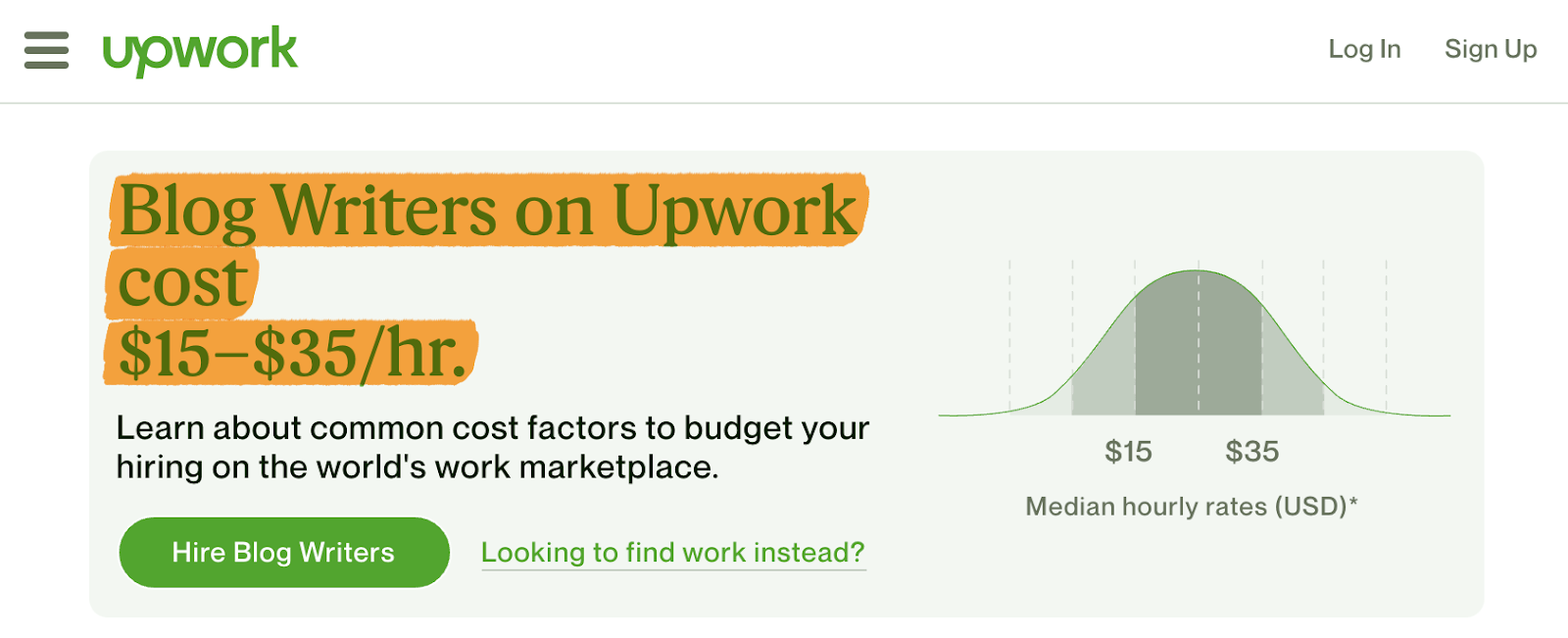
Here’s what the final spreadsheet might look like:
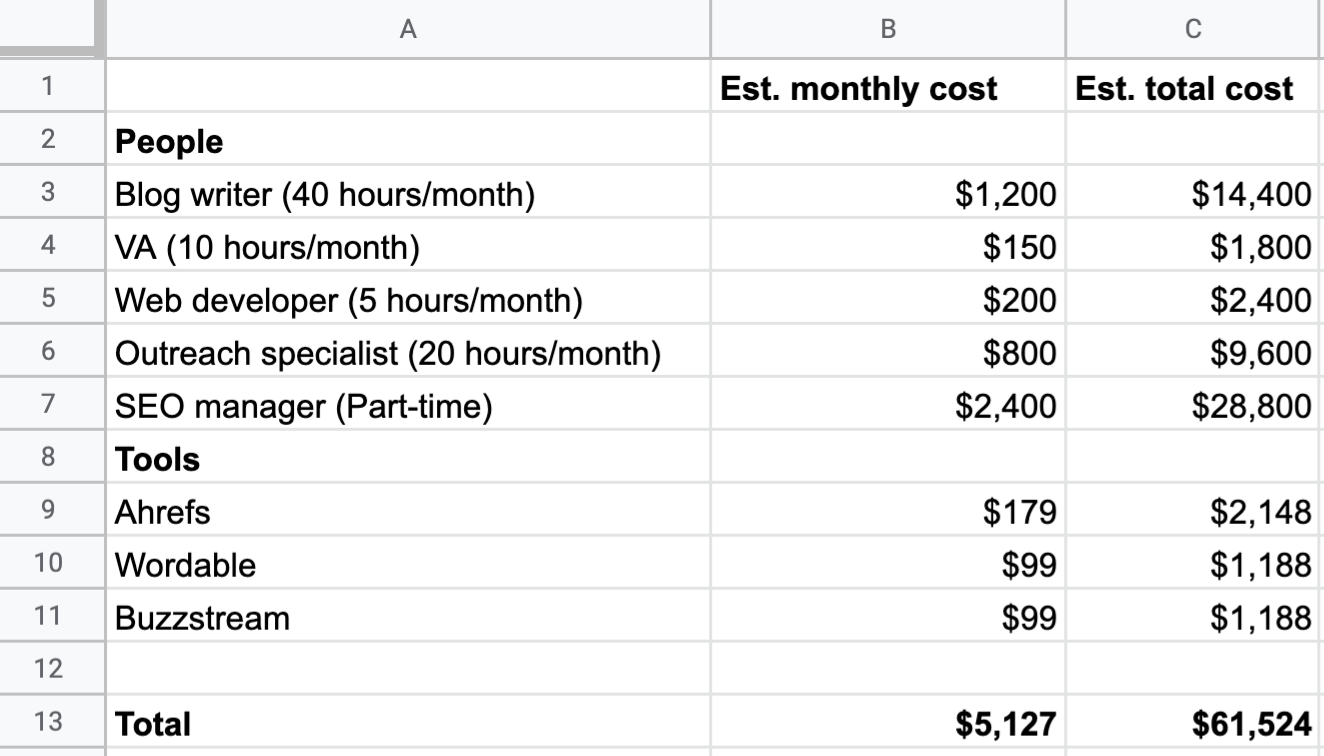
Although this is a good start, it doesn’t tell your boss anything about ROI—which is what matters. Unfortunately, this is harder to calculate than it sounds because your SEO efforts will continue to bear fruit long after the initial project comes to an end.
For that reason, it makes more sense to create a “break-even” graph. This shows how long it’ll take to recoup the investment in SEO.
For example, let’s say that the projected cost of your project is $5,127 per month. Because SEO takes time, we’ll be pessimistic and assume no revenue increase for the first six months before gradually increasing to $40,000 and eliminating the need for ad spend in month twelve.
Here’s what that would look like:
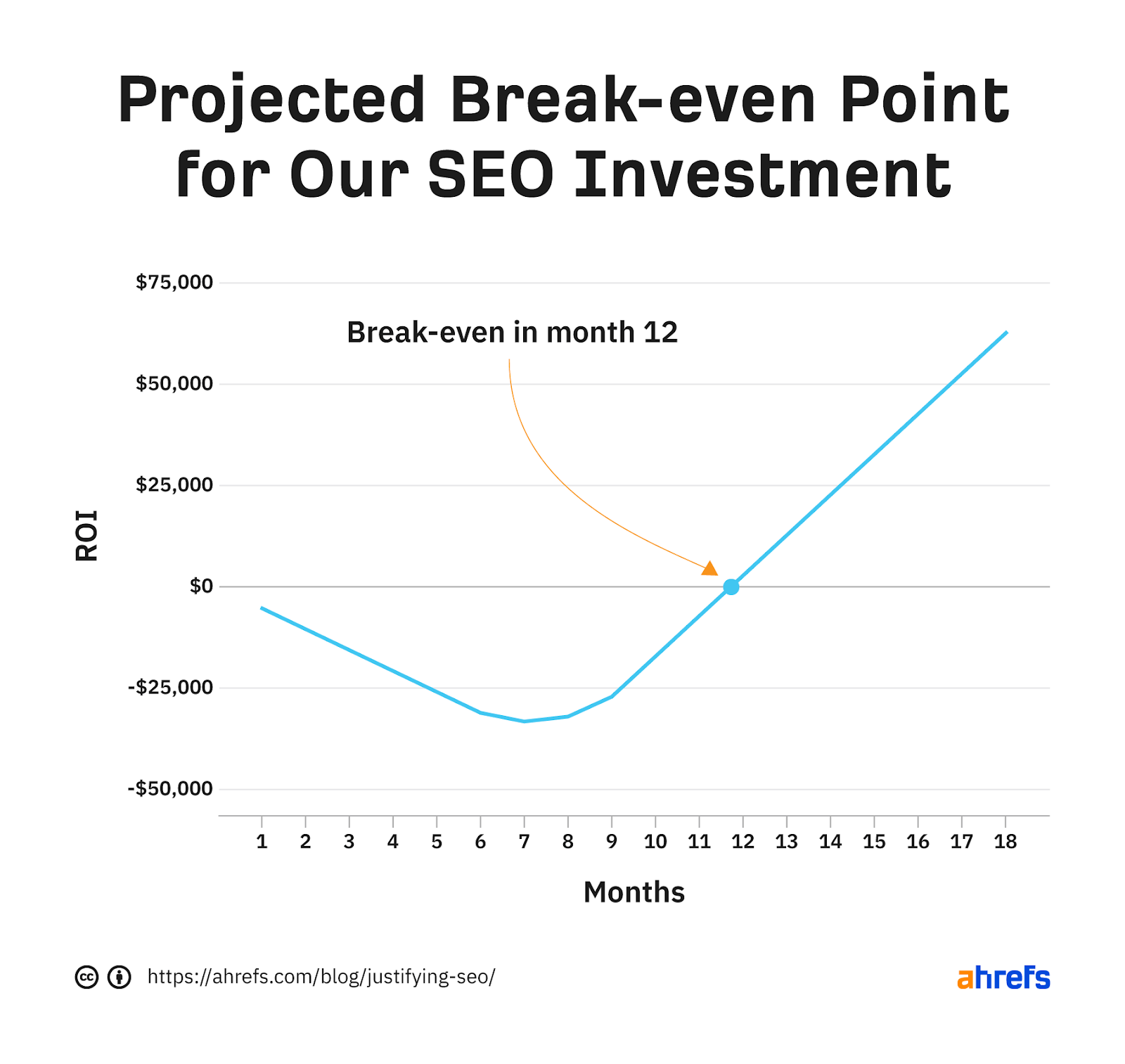
You can see that in this case, the “break-even” period occurs in month 12.
Just remember to use conservative numbers here. After all, you don’t want your boss breathing down your neck the second your proposed “break-even” period comes around. You should also make it clear that these are just estimations; you can’t guarantee anything.
Step 5. Dispel myths and tackle objections
You should be nearly home and dry by this stage, but your boss will probably still have a few questions and concerns. Answering these will require a bit of thinking on your feet as questions vary, but a few common concerns tend to pop up.
Let’s look at a few of them.
“Isn’t SEO just snake oil?”
Given the number of dishonest SEO services on the market (I’m sure we’ve all had those calls promising first-page rankings), this is more than a fair question.
But how do you tackle it without getting too defensive?
The best starting point is honesty. Explain that while some “snake oil” SEO service providers prey on vulnerable business owners, the process of SEO in itself is legit. It’s simply the process of influencing known Google ranking factors to help pages rank higher in the search results.
You can also use “social proof” to your advantage. For example, you can show that 60% of marketers say inbound marketing practices such as SEO are their highest quality source of leads:
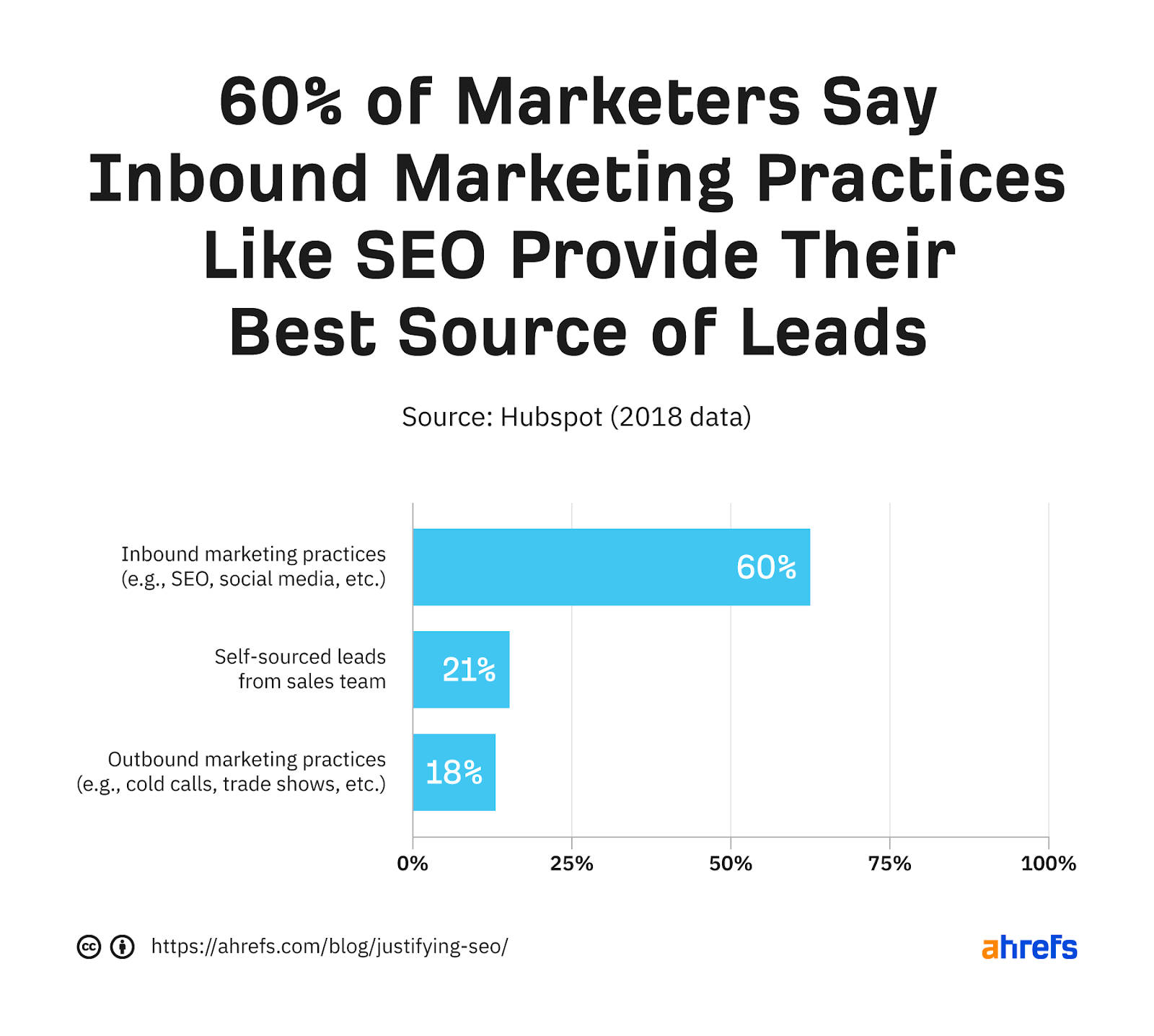
If you want to go further, consider showing your boss ‘Traffic Value’ metrics from Ahrefs’ Site Explorer for competitors that are doing well. Explaining how competitor A gets an estimated XXXX organic visits per month valued at $XXXX will likely drill home just how well SEO can work.
“Doesn’t SEO take forever?”
This is another question where honesty is the best policy because SEO does indeed take time. Rankings don’t happen overnight, and anyone that says otherwise is likely selling “snake oil.”
In fact, according to our study of two million keywords, only 5.7% of pages rank in the top 10 within a year:
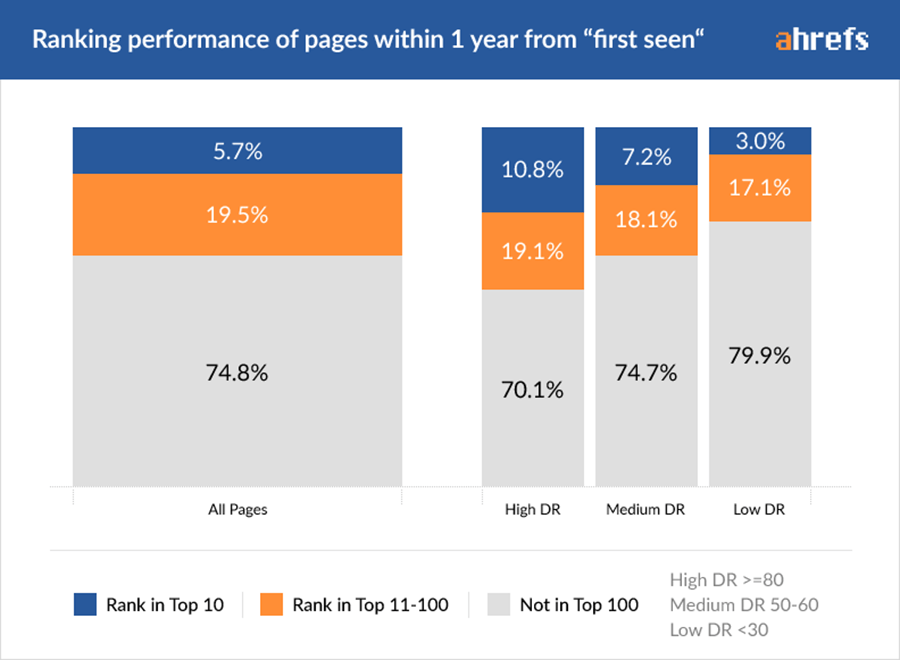
Most bosses know that there’s no silver bullet in marketing, so explaining that something takes time isn’t necessarily a bad thing. It shows that you understand how things work and that you have a realistic outlook. Think of it as a positive, not a negative.
“What if we get wiped out by a Google update/penalty?”
Google updates and penalties are scary topics, and quite rightly so. Plenty of sites have seen their organic traffic wiped out pretty much overnight following a penalty.
Here’s just one example:

If you’re following “ethical” SEO best practices, manual penalties aren’t something you need to worry much about.
However, Google does update its ranking algorithms multiple times a year. These can negatively impact your traffic, but they’re unlikely to wipe you out completely. You’ll usually just see a slight dip or gain in traffic—or no change at all.
Final thoughts
Convincing your boss to invest in SEO can be difficult, but the benefits can be immense. We’re proof of this. Our investments in SEO-focused content have sent countless customers our way and helped to put our brand firmly on the map in the SEO industry.
If you want the same for your company, you need to learn to speak your boss’s language and frame things in a way that resonates with them. Keep the SEO jargon for conversations with like-minded colleagues.
Got questions? Ping me on Twitter.




